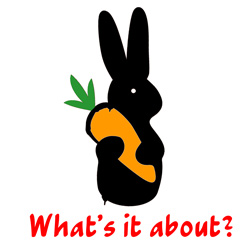





 |
| Good question. The blurb tells us this:
England, 2022. There are 1.2 million human-sized rabbits living in
the UK. They can walk, talk, drive cars and like to read Voltaire, the result of an Inexplicable Anthropomorphising Event fifty-five years
before. A family of rabbits is about to move into Much Hemlock, a cosy little village in Middle England where life revolves around summer fetes, jam-making, gossipy corner stores, and the oh-so-important Best Kept Village awards. No sooner have the rabbits arrived than the villagers decide they must depart, citing their propensity to burrow, breed, and shameless levels of veganism. But Mrs Constance Rabbit is made of sterner stuff, and her and her family decide they are to stay. Unusually, their neighbours, long-time residents Peter Knox and his daughter Pippa decide to stand with them - and soon discover that you can be a friend to rabbits or humans, but not both. With a blossoming romance, acute cultural differences, enforced rehoming to a MegaWarren in Wales, and the full power of the ruling United Kingdom Anti Rabbit Party against them, Peter and Pippa are about to question everything they'd ever thought about their friends, their nation, and their species.
That's what's on the back cover, but what's inside? Who are these rabbits, and how do they live? Is it kind of like Watership Down
? It's like Watership Down in that there are rabbits in it - but Watership Down meets District 9 would probably be closer - with some of The Court Jester and any Romcom you care to mention thrown in for good measure. Here's an excerpt:
Ross & Rabbits
Rabbity was the English word for the rabbit language; the rabbit word was 'Niff', one of their few pronounceable words. Dismayingly, Niff could also mean, depending on context: 'Rabbit, Life, wholeness, carrot (straight), warmth, sky, ratchet screwdriver, aeroplane, wagon, carrot (curved) Wensleydale cheese, hopscotch and sleeve-valve engines. Ross-on-Wye had a pre-rabbit population of eight thousand, all human. Today that had risen to twenty thousand, chiefly rabbits. Most were long-term residents, part of an early experiment in rabbit/human integration undertaken in the seventies by RabToil, which had initially been set up as an NGO to find employment for rabbits, but had grown and darkened over the years to control all rabbit employment and was now integrated into the Ministry For Rabbit Affairs. The Ross integration experiment, while hugely successful at the time and still regarded as the gold standard for peaceful inter-species co-existence, was never rolled out further due to a concerted smear campaign by UKARP who despised the concept of integration and instigated numerous complaints about the rabbit's: 'bacchanalian nature of rampant promiscuity that would surely corrupt the nation's youth'. Despite no evidence that the nation's youth needed any outside forces to help corrupt itself in the least, UKARP succeeded in casting doubt over further integration and were as surprised as anyone when their plan succeeded. They used it as a springboard to further pursue their anti-rabbit agenda. No-one could have foreseen that they'd actually lead the nation four decades later. 'Before Ross we had only failure,' said a spokesman for UKARP, 'afterwards, only success.' Despite the leporiphobic rhetoric, the once sleepy market town of Ross was now a bustling centre of commerce which encompassed trade, crafts, literary and artistic pursuits as well as two centres for higher learning that revolved around philosophy, high cuisine and sustainability. While a few residents initially complained about the rabbits, all were won over by the vibrant nightlife, friendly upbeat manner of the newcomers and, of course, the trading opportunities. Although rabbits were not paid well, they liked to spend it quickly. The gourmet lettuce bars did particularly well, as did the numerous greengrocers, a thriving bookstore and several Hookah-dens where rabbits discussed politics, economics and carrot hybridisation issues while their hookahs bubbled and puffed with the aromatic scent of a variety of rabbit-tobacco: dock-leaf, catnip, burdock, celeriac and dandelion. More relevant to the Rabbit Compliance Taskforce, Ross was by local statute an 'Open Town' both commercially, residentially, and - crucially - those on a day permit from Rabbit Colony One, eight miles to the East. Due to a well-intentioned by-law passed forty years before, busloads of rabbits could move between the two locations without identification checks, something of a headache for RabCoT as it made free movement that much easier. Lugless spoke on the radio to make sure all the units were in position, then dug a carrot out of a brown-paper bag and crunched on it noisily. "So," I said, trying to ignore the carrot crunching, "you're a AA-002?" "Yup," said Lugless, neither wanting nor expecting to expand upon the subject. Since he carried the alphanumeric surname he would be descended from the three laboratory rabbits anthropomorphised at the Event. The DG-6721s were the most numerous with the MNU-683s not far behind. They all suffered ongoing health issues due to experimentation pre-Event, aside from the AA-002s who to their constant shame had been a 'control rabbit' in the lab and subjected to no tests at all, something that gave them huge residual guilt that often manifested itself in antisocial behaviour. That, in itself, wasn't enough to be cropped. Lugless must have done something seriously unpleasant. Either improper sexual conduct or doing what he was doing now. Rabbits despised a collaborator as much as they despised those who extracted favours by coercion. We sat for another five minutes in silence. "Am I here on some sort of test?" I asked. "I don't know," said Lugless without looking up, "are you?" "I was on the Dylan Rabbit arrest detail," I said, "the Senior Group Leader wanted me to concur on an ID and I wasn't sure but-" "-is there a point to this story?" asked Lugless, "Because you're getting kind of whiny in that uniquely human way." "I guess not," I said, "but an innocent rabbit was jugged and-" "-look," said Lugless, "there are no innocent rabbits. There are simply those who have drifted into criminality, and those that will. You heard Whizelle and Flemming: There is an extremely good chance that the rabbit community might be planning to kick off a LitterBombing campaign that will outnumber Fudds in this green and pleasant land by at least three to one in under five years. Do you want to be outnumbered in your own country?" "Well, no, obviously." "Right then," said Lugless, so why don't you shut your trap and leave broad strategy to Nigel Smethwick and the Senior Group Leader?" I fell silent. The notion of Reproductive Weaponisation had been the pet conspiracy theory of UKARP for over four decades, but given the rabbits had been here fifty-five years and barely numbered a million, 'commendable restraint' would be a more realistic appraisal of their reproductive habits.
Intriguing? I hope so. Want to know more? Like who is actually is in the book?
Have a look at some of the cast:
Constance Rabbit, more commonly known as 'Connie'. Married to Clifford Rabbit and a mature Wildstock, she is 'Off Colony', a legal standing that doesn't hold much water with the residents of Much Hemlock. A rabbit is a rabbit, after all. They breed, you know. Clifford Rabbit: Connie's third Husband, and ex-services. More usually known as 'Doc', and acutely aware that Connie may decide to look elsewhere for next year's husband. Quite a good duellist, as the holes in his ears might testify. Peter Knox: Our likeable protagonist, and a single parent. When not running the local speed librarying team, he works down at the Regional offices of the Rabbit Compliance Taskforce in Hereford. A job that he finds awkwardly at odds with the reacquaintance of Connie, an old friend from Uni. Pippa Knox: Peter's daughter, training to work in hospital management, and whose relationship with Toby Mallett is a cause for parental concern. Norman and Victor Mallett: Self-styled protectors of the 'cultural heart' of Much Hemlock. Not much liked, even by the other Malletts. Toby Mallet: Peter's workmate and boyfriend to his daughter, con of Victor. Plays squash with the Senior Group Leader, but only for purposes of advancement. Kent Rabbit: Connie's son by a previous marriage. Kent has burrowing issues, and wears an ankle tag for 'Burrowing without due care and attention'. Bobbie Rabbit: Connie's daughter by a previous marriage to Dylan Rabbit. Headstrong and argumentative, she is probably a great deal similar to Connie when she was a teenager. Might be associated with the Rabbit Underground, and if she is, will probably have the codename Bridgette. Much Hemlock: A little village in Herefordshire which has the dubious boast of burning more witches in the fifteenth century than any other village. This came to an end when they burned a real one by accident, and everyone came out in large black pustules and died within 24 hours. Rabbit Compliance Taskforce: The governmental body, formed under the auspices of the Ministry for Rabbit Affairs. There is a regional headquarters in Hereford, where Toby and Peter work. The Senior Group Leader: The Head of the Rabbit Compliance Taskforce in Hereford, and a particularly nasty piece of work. Lugless: A ear-less rabbit who works for the Rabbit Compliance Taskforce. MegaWarren: A large tract of land in Wales to where it is proposed all the on-colony rabbits will be sent as part of the government's 'rehoming' initiative. The move will be optional, but that might be reviewed if the 'Optional' option is not enthusiastically taken up. Nigel Smethwick, MP: Prime Minister of the United Kingdom, and also head of the ruling United Kingdom Anti Rabbit Party. Rabidly anti-rabbit, he is also MP for Hereford East, which conveniently allows me to get him into the action.
So that's roughly what it's about, a sneak preview and a little of who is in it - but what is it really really really
about? Okay then:
I like to think I write absurd books with a serious thread. In Shades of Grey I was looking at a rigid social order imposed upon the very members of society it imprisons, solely due to their unquestioning adherence to written doctrine. In Early Riser humans stumble through their lives as best they can while the spectre of climate change extinction looms close by. The Thursday Next books were about reclaiming the classics from academia, Last Dragonslayer a semi-treatise on the power of greed. Alternate History? Satire? Tragicomedy? Who knows. The thing is, the social and political satire have always been side-themes within a broad fantasy - I've always shied away from going 'the full soapbox' because I consider myself first and foremost an entertainer, and the unspoken compact with my readers is to do exactly that. To entertain with an eclectic mix of comedy, absurdity, and yes, satire. But while writing The Constant Rabbit and simultaneously fuming over Brexit I found myself straying into troubling waters: I was writing about discrimination and prejudice, right here in contemporary Britain. And this was a problem: How could I even possibly begin to understand the subject as I've never been discriminated against. That's not 'never' as it 'not often' it's 'never' as in 'not once' Not Once. And I don't think that's possible without a very good reason: I, like many others like me, won the lottery without actually buying a ticket: White, Male, European, Moneyed, Middle Class. But then I had another thought: As an economic foot soldier of the dominant social group that is doing the oppressing - and there is little doubt that we are living in a nation awash with discrimination based on skin colour, class, religion, ethnicity - I actually do have a relevant opinion on the subject of discrimination because ... I'm doing it. Not in an overt white supremacist putting-poo-through-the-letterbox profanity ridden N-word rant kind of way, but far more subtly, yet arguably no less damaging: Since I defaulted at birth to enjoy the bounteous fruits of a discriminatory society - what Renni Eddo-Lodge rightly calls 'never-questioned entitlement' - and that those same societal benefits I enjoy are accrued upon the historical and continuing disadvantage of others, I have got to be part of the problem. And that's what the book came to be about. This isn't just a book about discrimination, it's about fear, and fragility, privilege, and unconscious complicity. Peter Knox, like many of the generally amiable non-rabbit citizens of this island is Leporiphobic. He tells himself he isn't, he takes dangerously false solace that he is certainly a 'lot better than some', and tries his hardest to be only a peripheral and blameless agent within the system - but by his actions and acceptance of the status quo, he is very much a part of it. Peter's journey from incurious complicity to qualified understanding mirrors my own journey, acquired over years of critical self analysis. Not just of myself, but of my nation - and what it historically means to be ex-Empire British, and how one interprets Brexit against the backdrop of rising populism, xenophobia and a worrying lurch to the political right. But don't let all this heaviosity put you off - The Constant Rabbit is first and foremost entertainment. At times it's serious, but at other times it's odd, surreal, and just pretty **cking silly. Did I worry about how my treatment of a extremely serious subject could be seen as frivolous and crass? Possibly. Did I fret over this daily? Yes. Am I worried about it right now? Sure. But y'know, when I really think about it, whatever it is I'm worried about - looking a twit, perhaps - pales into precisely nothing at all when set against the risks run by anyone from a marginalised group when they dare say anything about structural prejudice. So will The Constant Rabbit help, or just become the constant rabbit itself, that endless well-meaning chatter that makes we privileged feel good about ourselves, but never lead to meaningful change? I don't know, but I can hope. The most favourable outcome for me is that you laugh when you are reading this book, and frown a little when you have finished - and that together, eventually, as part of a much larger and broader and more principled coalition, we can start to loosen some bricks in that wall. And that, I hope, is what this book is all about. Jasper Fforde June 2020 |
|
|
|
Updated June 15th 2020 |